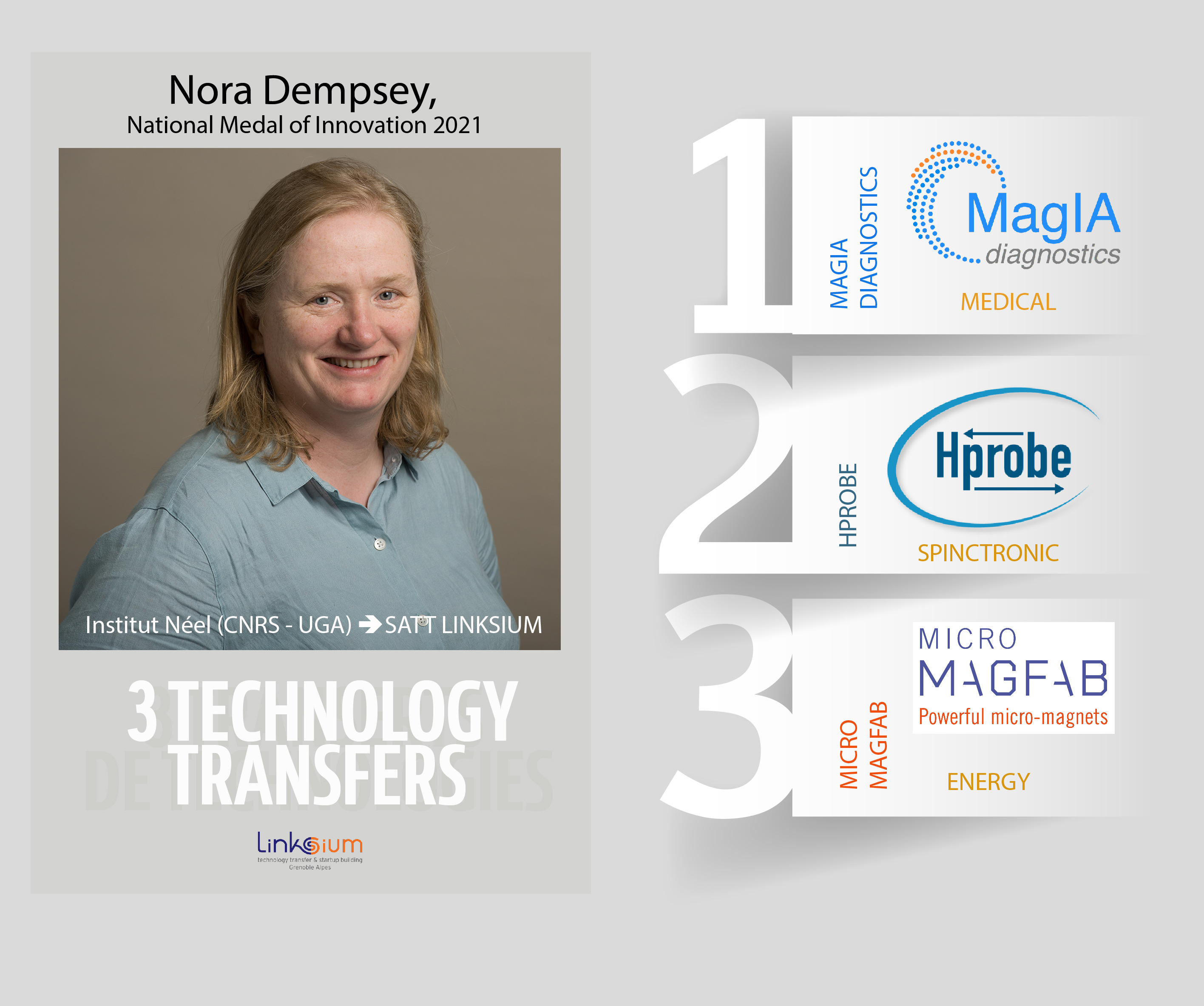1, 2 and 3 startups for Nora Dempsey, National Medal of Innovation 2021
Nora Dempsey is one of the four winners of National Medal for Innovation 2021 awarded by CNRS. Nora Dempsey, born in Ireland, has gained an international recognition for her research in Grenoble on high-performance micro-magnets. Nora Dempsey has created one startups with Linksium, has supplied a technology to second startup and has started the emergence of a third in the process of maturation. Discover a full interview about her amazing journey !

Patents resulting from Nora Dempsey's research have been licensed to two Linksium startups, and she is currently working towards the creation of another startup
- MAGIA DIAGNOSTICS:
Nora Dempsey has contributed to the emergence of Magia Diagnostics, a company that uses micro-magnets to capture molecules for medical diagnostic applications.
Magia Diagnostics currently has 14 employees (including Paul Kauffmann the CEO). The startup raised €3 million in 2020, and expects to achieve €10 million in revenue by 2024.
- HPROBE
Her research in collaboration with Brazilian colleagues on the generation of intense magnetic fields has led to the development of a system for the rapid characterization of magnetic layers. These results now give the startup HProbe the ability to improve magnetic field testing of MRAM memories.
In 2020, Hprobe was granted the exploitation rights to the patent resulting from this work. Hprobe is itself a startup supported and co-founded by Linksium. Headed by Laurent Lebrun, the young company raised 2 million in 2020 and continues to expand its sales internationally.
- MICROMAGFAB
Nora Dempsey's third project is currently maturing: MicroMagFab, based on an innovative process for synthesizing and characterizing micro-magnets, which makes it possible to integrate them into MEMS such as actuators, energy recovery systems or micrometric sensors.
COMBINING FUNDAMENTAL RESEARCH AND APPLICATION PROJECTS
Her idea? "To push academic ideas towards commercialization," says Nora Dempsey. But let's be clear: "I consider myself first and foremost a researcher, not an entrepreneur," she says. And she continues: "In France, there is still money for research. This is not always the case in other countries. In Dublin, when I did my thesis, there was very little public funding, which is why I had to look for funding elsewhere. And then I developed the culture of setting up research projects, which is something I'm passionate about. "
The combination of fundamental and applied work is a personal choice that Nora Dempsey fully assumes, along with the colleagues in her group, which also includes a dozen researchers, including numerous doctoral students and post-docs. Building a sustainable and motivated team requires funding that we usually seek from ANR and European projects, from industry, from foundations, etc. "
HAVING MORE IMPACT
"The fact that my research helps solve problems with a high societal impact" is a key element of Nora Dempsey's motivation. It is in this context that the magnetism researcher encourages her team to set up transfer projects with Linksium to get closer to entrepreneurs and deploy the technology on the market through a company. The creation of deeptech startups offers significant investment and development opportunities. On the one hand, by applying the work in a concrete product or service that can be monetized, and on the other hand, by providing the necessary funding to pursue research without the risk of subsidies from public bodies.
ENTREPRENEURSHIP AND ACADEMIC RESEARCH FEED EACH OTHER
It is also a way to motivate and develop the skills of your team. Entrepreneurship and academic research feed each other. "You shouldn't be afraid to fail! Every brick developed can be reused in another application. In France, in the laboratories, there is still real support from research. We benefit from the permanent support of engineers, technicians and administrative staff. In other countries, it is often the students who develop and maintain the research tools. In addition, in France, researchers are recruited at a younger age than elsewhere, on average three years after a thesis. "Nora Dempsey remains lucid, however. "Entrepreneurship as a researcher depends on the field and the state of research. Not all sectors lend themselves to it. "
